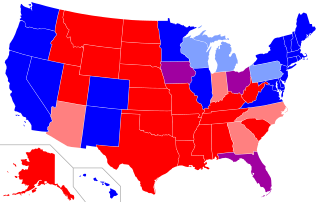| Politics of Jersey |
|---|
 |
| Category |
The following by elections for Deputy took place in 2000 in Jersey.
| Politics of Jersey |
|---|
 |
| Category |
The following by elections for Deputy took place in 2000 in Jersey.
Election date: May 2000 [1]
The Green Party of the United States (GPUS) is a federation of Green state political parties in the United States. The party promotes green politics, specifically environmentalism; nonviolence; social justice; participatory democracy; grassroots democracy; anti-war; anti-racism; eco-socialism. On the political spectrum, the party is generally seen as left-wing. As of 2023, it is the fourth-largest political party in the United States by voter registration, behind the Libertarian Party.

The 2000 United States presidential election was the 54th quadrennial presidential election, held on Tuesday, November 7, 2000. Republican Texas Governor George W. Bush, the eldest son of George H. W. Bush, narrowly defeated incumbent Democratic Vice President Al Gore. It was the fourth of five U.S. presidential elections, and the first since 1888, in which the winning candidate lost the popular vote, and is considered one of the closest U.S. presidential elections, with long-standing controversy about the result. Gore conceded the election on December 13.

The 1996 United States presidential election was the 53rd quadrennial presidential election, held on Tuesday, November 5, 1996. Incumbent Democratic President Bill Clinton defeated former Senate Majority Leader Bob Dole, the Republican nominee, and Ross Perot, the Reform Party nominee and 1992 Independent presidential candidate.

The 1972 United States presidential election was the 47th quadrennial presidential election held on Tuesday, November 7, 1972. Incumbent Republican president Richard Nixon defeated Democratic U.S. senator George McGovern in a landslide victory. With 60.7% of the popular vote, Richard Nixon won the largest share of the popular vote for the Republican Party in any presidential election.
Bush v. Gore, 531 U.S. 98 (2000), was a landmark decision of the United States Supreme Court on December 12, 2000, that settled a recount dispute in Florida's 2000 presidential election between George W. Bush and Al Gore. On December 8, the Florida Supreme Court had ordered a statewide recount of all undervotes, over 61,000 ballots that the vote tabulation machines had missed. The Bush campaign immediately asked the U.S. Supreme Court to stay the decision and halt the recount. Justice Antonin Scalia, convinced that all the manual recounts being performed in Florida's counties were illegitimate, urged his colleagues to grant the stay immediately. On December 9, the five conservative justices on the Court granted the stay, with Scalia citing "irreparable harm" that could befall Bush, as the recounts would cast "a needless and unjustified cloud" over Bush's legitimacy. In dissent, Justice John Paul Stevens wrote that "counting every legally cast vote cannot constitute irreparable harm." Oral arguments were scheduled for December 11.
A ballot is a device used to cast votes in an election and may be found as a piece of paper or a small ball used in voting. It was originally a small ball used to record decisions made by voters in Italy around the 16th century.

The Socialist Party USA, officially the Socialist Party of the United States of America, is a socialist political party in the United States. The party was established in 1973 as one of the successors to the Socialist Party of America, which had broken up a year prior, resulting in another group called Social Democrats, USA and the Democratic Socialist Organizing Committee (split).

The 2008 United States presidential election was the 56th quadrennial presidential election, held on November 4, 2008. The Democratic ticket of Barack Obama, the junior senator from Illinois, and Joe Biden, the senior senator from Delaware, defeated the Republican ticket of John McCain, the senior senator from Arizona, and Sarah Palin, the governor of Alaska. Obama became the first African American to be elected to the presidency, as well as being only the third sitting United States senator elected president, joining Warren G. Harding and John F. Kennedy. Meanwhile, this was only the second successful all-senator ticket since the 1960 election and is the only election where both major party nominees were sitting senators. This was the first election since 1952 in which neither the incumbent president nor vice president was on the ballot, as well as the first election since 1928 in which neither ran for the nomination.
An election exit poll is a poll of voters taken immediately after they have exited the polling stations. A similar poll conducted before actual voters have voted is called an entrance poll. Pollsters – usually private companies working for newspapers or broadcasters – conduct exit polls to gain an early indication as to how an election has turned out, as in many elections the actual result may take many hours to count.
"None of the above" (NOTA), or none for short, also known as "against all" or a "scratch" vote, is a ballot option in some jurisdictions or organizations, designed to allow the voter to indicate disapproval of the candidates in a voting system. It is based on the principle that consent requires the ability to withhold consent in an election, just as they can by voting "No" on ballot questions. It must be contrasted with "abstention", in which a voter does not cast a ballot.

Starting with the 2000 United States presidential election, the terms "red state" and "blue state" have referred to U.S. states whose voters vote predominantly for one party — the Republican Party in red states and the Democratic Party in blue states — in presidential and other statewide elections. By contrast, states where the vote fluctuates between the Democratic and Republican candidates are known as "swing states" or "purple states". Examining patterns within states reveals that the reversal of the two parties' geographic bases has happened at the state level, but it is more complicated locally, with urban-rural divides associated with many of the largest changes.

Bill Clinton, the 42nd president of the United States, was impeached by the United States House of Representatives of the 105th United States Congress on December 19, 1998, for "high crimes and misdemeanors". The House adopted two articles of impeachment against Clinton, with the specific charges against Clinton being lying under oath and obstruction of justice. Two other articles had been considered but were rejected by the House vote.

The 2004 United States presidential election was the 55th quadrennial presidential election, held on Tuesday, November 2, 2004. The Republican ticket of incumbent President George W. Bush and his running mate incumbent Vice President Dick Cheney were elected to a second term, defeating the Democratic ticket of John Kerry, a United States senator from Massachusetts and his running mate John Edwards, a United States senator from North Carolina.
The 2004 United States presidential election in Tennessee was held on November 2, 2004, and was part of the 2004 United States presidential election. Voters chose 11 representatives, or electors, to the Electoral College, who voted for president and vice president.

The Liberal Democrats are a liberal political party in the United Kingdom, founded in 1988. They have been the third-largest UK political party by the number of votes cast since the 1992 general election, with the exception of the 2015 general election. They have 15 members of Parliament in the House of Commons, 84 members of the House of Lords, four Members of the Scottish Parliament and one member in the Welsh Senedd. The party has over 3000 local council seats, the third largest of the British political parties. The party holds a twice-per-year Liberal Democrat Conference, at which party policy is formulated. In contrast to its main opponents' conference rules, the Lib Dems grant all members attending its Conference the right to speak in debates and vote on party policy, under a one member, one vote system. The party also allows its members to vote online for its policies and in the election of a new leader. The party served as the junior party in a coalition government with the Conservative Party between 2010 and 2015; with Scottish Labour in the Scottish Executive from 1999 to 2007; and with Welsh Labour in the Welsh Government from 2000 to 2003 and from 2016 to 2021.

The election of the president and the vice president of the United States is an indirect election in which citizens of the United States who are registered to vote in one of the fifty U.S. states or in Washington, D.C., cast ballots not directly for those offices, but instead for members of the Electoral College. These electors then cast direct votes, known as electoral votes, for president, and for vice president. The candidate who receives an absolute majority of electoral votes is then elected to that office. If no candidate receives an absolute majority of the votes for president, the House of Representatives elects the president; likewise if no one receives an absolute majority of the votes for vice president, then the Senate elects the vice president.

Ilankai Tamil Arasu Kachchi is a Sri Lankan political party which represents the Sri Lankan Tamil ethnic minority in the country. It was originally founded in 1949 as a breakaway faction of the All Ceylon Tamil Congress (ACTC). In 1972, ITAK merged with the ACTC and Ceylon Workers' Congress (CWC) to form the Tamil United Front, which later changed its name to the Tamil United Liberation Front (TULF). ITAK remained dormant until 2004 when a split in the TULF resulted in ITAK being re-established as an active political party. ITAK is a constituent party of the Tamil National Alliance.

The 2000 United States presidential election in Pennsylvania took place on November 7, 2000, and was part of the 2000 United States presidential election. Voters chose 23 representatives, or electors to the Electoral College, who voted for president and vice president.

The 2020 United States presidential election was the 59th quadrennial presidential election, held on Tuesday, November 3, 2020. The Democratic ticket of former vice president Joe Biden and the junior U.S. senator from California Kamala Harris defeated the incumbent Republican president, Donald Trump, and vice president, Mike Pence. The election took place against the backdrop of the global COVID-19 pandemic and related recession. The election saw the highest voter turnout by percentage since 1900, with each of the two main tickets receiving more than 74 million votes, surpassing Barack Obama's record of 69.5 million votes from 2008. Biden received more than 81 million votes, the most votes ever cast for a candidate in a U.S. presidential election.